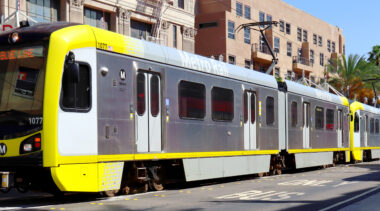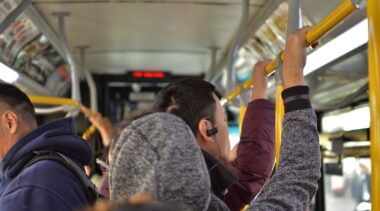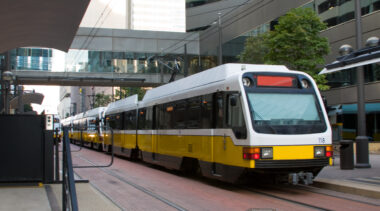Baruch Feigenbaum is senior managing director of transportation policy at Reason Foundation.
Feigenbaum has a diverse background researching and implementing transportation issues including revenue and finance, public-private partnerships, highways, transit, high-speed rail, ports, intelligent transportation systems, land use, and local policymaking. Prior to joining Reason, Feigenbaum handled transportation issues on Capitol Hill for Rep. Lynn Westmoreland.
Feigenbaum is a member of the Transportation Research Board Bus Transit Systems and Intelligent Transportation Systems Committees. He is vice president of programming for the Transportation and Research Forum Washington Chapter, a reviewer for the Journal of the American Planning Association (JAPA), and a contributor to Planetizen. He has appeared on NBC Nightly News and CNBC. His work has been featured in the Washington Post, The Wall Street Journal and numerous other publications.
Feigenbaum earned his master's degree in Transportation Planning with a focus in engineering from the Georgia Institute of Technology.
-
RAISE transportation grants go to non-transportation projects in committee members’ congressional districts
Of the 90 projects funded with Rebuilding American Infrastructure with Sustainability and Equity grants in 2021, only nine projects (10%) were national in nature.
-
Youngkin should prioritize modernizing Virginia’s transportation funding sources
Virginia’s highway system is lagging behind neighboring Atlantic states.
-
Texas Central shouldn’t get a $12 billion taxpayer-backed loan
The Houston-Dallas proposal has long been sold to the public as a privately financed high-speed rail system that doesn't need taxpayers' money.
-
California legislature was wise not to issue the remaining $4 billion of high-speed rail bonds
Without the bond proceeds, the California High-Speed Rail Authority will not be able to meet its intermediate objective of establishing service along 171 miles of electrified track between Merced and Bakersfield.
-
Texas Supreme Court Says Company Can Use Eminent Domain For Houston-Dallas High-Speed Train
While Texas Central is promising to benefit travelers going back and forth between Houston and Dallas, it would do so by interrupting the lives and livelihoods of many Texans living and farming along the route.
-
Transit Agencies Too Often Favor Choice Riders at Expense of Transit Dependent Riders
Mass transit funding and development policies cater to wealthier, choice riders who should be paying the full costs of the transit service, while those who can barely afford transit service are losing essential routes between their homes and workplaces.
-
Sales Taxes Are the Most Regressive Source of Transportation Funding
Roads and highways should be paid for by their users.
-
Bus Rapid Transit Provides Cost-Effective Mass Transit Options
For many high-density corridors, bus rapid transit is going to be a better, more cost-effective option than rail.
-
Remembering David Hartgen
The former professor and policy analyst made a major impact on the transportation world.
-
Biden Administration’s Civil Rights Review of I-45 Project In Houston Could Threaten Infrastructure Projects Everywhere
The Biden administration took the unusual step of pausing a Houston highway widening project by using a provision of the 1964 Civil Rights Act.
-
To Repair Its Deficient Bridges, Pennsylvania Should Embrace Value-Added Tolling
PennDOT and public-private partnerships can fully address concerns about wasteful government spending, double taxation, and the fairness of tolling.
-
Improve Efficiency in Transportation Funding By Using a Metric-Driven Process
A national metric could be modeled after North Carolina and Virginia, which utilize effective, objective project selection processes.
-
An Overview of Using Public-Private Partnerships to Build or Modernize Highways
Outlining five significant advantages of using P3s to build and operate transportation infrastructure.
-
Streamline the TIFIA Process to Fund Key Infrastructure Projects
The Department of Transportation should approve all projects that meet TIFIA criteria.
-
How to Refocus the Federal Share of Transit Funding So Maintenance Is Prioritized
Many of the mass transit systems across the country are in poor shape, in part because they direct money to costly new capital projects rather than needed maintenance.
-
Why Congress Should Expand the Use of Private Activity Bonds For Infrastructure
For megaprojects, $12 billion in private activity bonds led to $45 billion in infrastructure project activity over the past 15 years.
-
Is Level of Service or Vehicle-Miles Traveled a Better Way to Measure Traffic Congestion?
Part six of Reason's Debatable Ideas series examines the best method to analyze travel times and traffic congestion in a region.
-
It Is Time For a Market Approach to Parking
For too long, cities have prioritized subsidizing free parking in order to allow ease of mobility by automobiles, but economically this does not make sense.


















